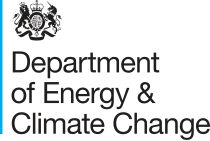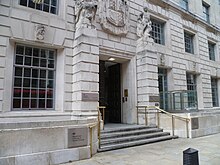Department for Energy and Climate Change
 |
|
 3 Whitehall Place, London |
|
| Department overview | |
|---|---|
| Formed | 2008 |
| Dissolved | 14 July 2016 |
| Jurisdiction | United Kingdom |
| Headquarters | 3 Whitehall Place, London |
| Annual budget | £1.5 billion (current) & £1.5 billion (capital) in 2011–12 |
| Child Department | |
| Website | www |
The Department of Energy and Climate Change (DECC) was a British government department created on 3 October 2008, by then Prime Minister Gordon Brown to take over some of the functions related to energy of the Department for Business, Enterprise and Regulatory Reform, and those relating to climate change of the Department for Environment, Food and Rural Affairs.
It was led at time of closure by the Secretary of State for Energy and Climate Change, Amber Rudd MP. Following Theresa May's appointment as Prime Minister in July 2016, the department was disbanded and merged with the Department for Business, Innovation and Skills, to form the Department for Business, Energy and Industrial Strategy under Greg Clark MP.
The Department released a major White Paper in July 2009, setting out its purpose and plans. The majority of DECC's budget was spent on managing the historic nuclear sites in the United Kingdom, in 2012/13 this being 69% of its budget spent through the Nuclear Decommissioning Authority. The costs to the government of nuclear decommissioning are expected to increase when the last of the United Kingdom's Magnox reactors are shut down and no longer produce an income.
In July 2014, a private member's bill was proposed in Parliament, sponsored by Conservative MP Peter Bone, to abolish the Department of Energy and Climate Change and absorb its portfolio into the Department for Business, Innovation and Skills. In the House of Commons, it was scheduled for a second reading on 6 March 2015. However, as a private members bill, it was unlikely to be passed without government support, which in the event it failed to get.
...
Wikipedia
